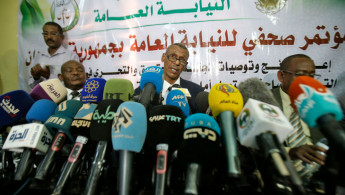Sudan opposition reject findings of probe into deadly sit-in dispersal
Sudanese opposition groups have rejected the findings of probe into the deadly June 3 raid on a Sudanese protest camp that has absolved the country's ruling generals of guilt.
The Sudanese Professionals Association and the National Congress Party on Saturday criticised the result of the prosecutors' investigation into the deadly break-up of the protest camp last month.
Prosecutor Fatah al-Rahman Saeed announed that the generals did not order the crackdown and that eight officers from the paramilitary Rapid Support Forces had exceeded their orders.
He said the RSF was told to clear a lawless area close to the sit-in, not to raze the protest camp.
Saeed, who heads a committee investigating the dispersal, said on Saturday that the officers, including a major general, have been accused of crimes against humanity.
Protesters and rights groups have accused the paramilitary force of carrying out the raid, but the deputy chief of Sudan's ruling military council General Mohamed Hamdan Daglo who also heads the RSF has steadfastly denied his group's involvement.
The Professionals Association, which has signed power-sharing deal with the ruling generals, said the result of the probe had "undermined justice".
"We have rejected the formation of this committee from the beginning. We demand an independent probe overseen by the Afrian Union," the Association's spokesman said.
The National Congress Party said the probe had "buried the facts under rubble" and that the break-up was carried out based on a "political decision" made by the authorities
Doctors linked to the protest movement say 127 people were killed during the raid.
Earlier this month, the military council and the Professionals Association reached a power-sharing agreement, including a timetable for a transition to civilian rule.
The deal would establish a joint civilian-military sovereign council that would rule Sudan for a little over three years while elections are organized.
But leaders of the movement have said they do not want any political parties taking part in the transitional government, insisting that the upcoming transitional government be made up of experts and technocrats.
Hundreds of Sudanese took to the streets Thursday in Khartoum and elsewhere in the country to support this demand.





 Follow the Middle East's top stories in English at The New Arab on Google News
Follow the Middle East's top stories in English at The New Arab on Google News


